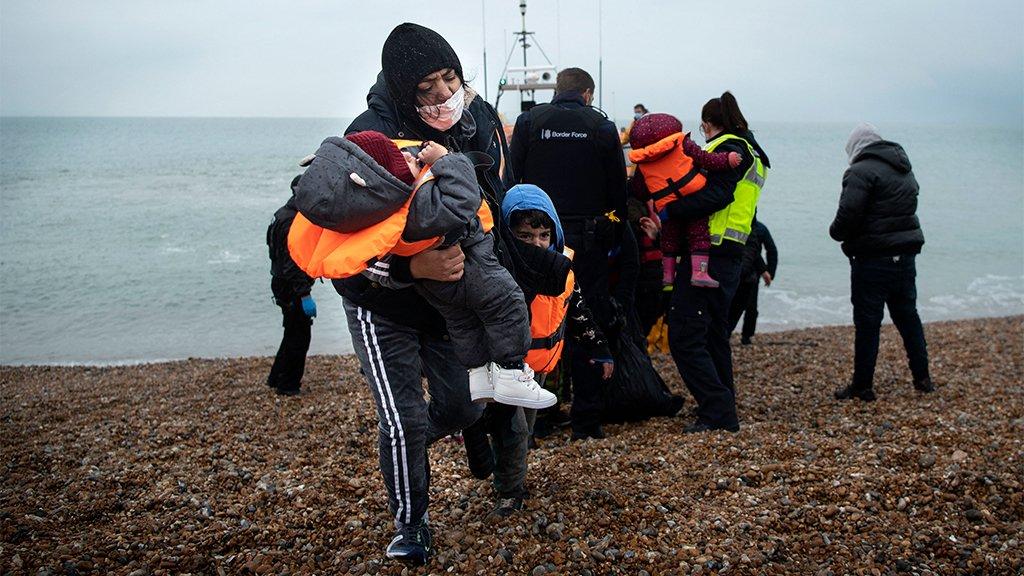The English Channel: How did these beaches become a market for a deadly trade?
Migrants make harsh journeys across the two banks of the English Channel, and the crisis is represented in their entry into smuggling operations similar to those carried out by the militia in the French hills, and ends with swarms of them being thrown by the water on the beaches of Kent in England.
b>
Under the scattered sands of northern France, there are the remnants of an international criminal industry: a discarded life jacket, a backpack and a gallon of petrol.
It's an industry complex enough to custom-make boats and transport them across EU borders, a ruthless industry in which customers are crammed for hours in the bush before putting them aboard.
Twenty-seven people were confirmed dead on Wednesday, after their rubber boat capsized, the worst tragedy so far since these crossings began.
But the next morning, more boats left the northern shores of France for England, crowded with migrants who had not been deterred by the tragic incident of the previous day.
Skip topics that may interest you and continue reading. Topics that may interest youtopics that may interest you. End
When newcomers arrive in these camps, they are given advice on how to find people smugglers.
A young man, who had recently fled Afghanistan, was told to look for the "Kurdish man" who hung out at the twice-weekly food distribution. No one the BBC spoke to had problems finding someone to help them sail to Britain.
An Iraqi Kurd wanted to reach her fiancé.. She was one of the victims of the Channel 1 tragedy
Manche Channel: Why do so many Iraqi Kurds risk their lives to reach Europe?
Why do Arab youth insist on emigrating despite the harshness and dangers of the journey?
Skip the podcast and read onMorahakatyTeenage taboos, hosted by Karima Kawah and edited by Mais Baqi.
The episodes
The end of the podcast
Smuggling networks often use the migrants themselves to manage the logistics on the ground. These are the same makeshift camp residents in northern France who are disillusioned with attempts to get out and find it hard to get out, so they simply seek to make some money, or They are looking forward to leaving and need to secure a place on a boat.
They act as sentinels, hidden along the coast, appearing unawares and, sometimes, only a few days before a boat is due to set off.
They note the movements of the security forces and alert fellow smugglers when it is time for travelers to emerge from their hideouts along the beach and run towards the sea.
Those in hiding are told shortly before that day to prepare themselves to leave their camps. They usually met at a secret meeting point before walking the long distance to the coast, where migrants say there are strict rules about behaviour, speaking and mobile phones. Finally they endure a long wait in their hideout in the sandy hills.
These hiding places are dotted along the coastline, not only among sandy hills, but in woods and World War II-era concrete bunkers, dotted with personal belongings left behind by previous travelers.
On a Friday at the Plage du Bric, a popular jumping-off point between Calais and Dunkirk on an industrial, windswept stretch of coast, signs of life appeared everywhere. Tarpaulin sheets. Pink sneakers that were half buried in the sand.
Amidst the sandy hills, there is an abandoned tent surrounded by plastic juice bottles.
A man who has worked with smugglers in the past, let's call him David, explained to us that every smuggler has his own favorite hiding place.
"They wait until the last moment, then bring the travelers one by one towards the beach, hiding them behind rocks or trees."
Passengers stay off boats until the last minute, says David, not for their own protection but to protect the boat if it is discovered by the police who may confiscate or wreck it.
The boats often come from Germany or Belgium, to avoid the French police.
Many of the people in the networks that operate here are said to be EU nationals who can easily drive vehicles and transport equipment across the border into France.
Police say the boats are specially designed to be long, simple and inflatable, to accommodate as many people as possible, and their simple structure makes them particularly dangerous.
Separating the inflatable boats into separate sections will help reduce any damage and loss of air if a section punctures. But smugglers often don't bother to reinforce the bottom of the boat with solid boards, which means that the boats shrink and collapse when deflated, as one French minister put it, likening it to an "inflatable children's pool."
Everyone is aware of these risks. The eyes of many of the migrants waiting to cross in these camps do not lose sight of weather forecasting applications in the English Channel on a daily basis.
The waves, more than a meter high, pose a real danger, but this does not discourage few from the trip. Those who realize the dangers of the journey find themselves facing a real dilemma.
Criminal gangsters don't care what might happen to immigrants, they only care about getting money from them.

There are reports that they threaten customers if they change their minds about the trip.
There are many networks that have relationships with different communities and camps, and they are often in fierce competition with each other.
A local mayor told the BBC that territorial wars had become so fierce in the past year that some smugglers had started to take up arms.
There is an unknown aspect of what smugglers get from their victims, says David.
Extortion of women and the poor
"Some of them ask women who want to cross to have sex." The poorer migrants, who can only collect a fraction of the asking price, will all be crammed into old, overcrowded boats when the dangers of crossing increase.
The stakes increased further after the French security forces increased the number of their patrols. The government says it has thwarted more than half of the crossing attempts.
However, the patrols are run by different teams according to the region and time: the gendarmerie, the police, reservists, and professional soldiers.
Accusations between police teams are a regular feature of working in this corps here.
The BBC team went out with patrols with the units walking through the sandy hills, the members of some patrols were talking and having fun while waving flashlights, and the members of other patrols were more silent, careful and disciplined.
But they are facing larger groups of migrants than before, up to about 80 or 90 at a time, one security commander told us, and they are often more aggressive too.
The smugglers know that the patrols can't interfere with a crossing if it would put lives in danger, so the smugglers tell travelers, "Just get in the water and you'll be in the UK." Some land patrols wade into shallow waters to pull boats ashore, but once Once out at sea, unvulnerable boats are simply watched by the French Coast Guard as they drift towards British waters. French authorities offer assistance to anyone in danger, but the British Border Patrol unit told the BBC that migrants are often reluctant to seek help while they are there. in French waters, for fear of being returned to French territory.
Once they cross the dividing line in the middle of the Channel, migrants are usually happy to be rescued.
Dover's Coast Guard is in charge, and they usually field Border Patrol vessels and RSC lifeboats.
The migrants are being helped aboard the ship and huddled under blankets for the last leg of their journey to England.
However, on the busiest days, British fishermen are often unwittingly the first on the scene.
"It's a daily occurrence," says Jerry Euler, who has run a licensed fishing boat off the Kent coast for more than three decades.
Earlier this year, we found two men in a rubber dinghy four miles offshore.
"The boat capsized with them, but we were able to save them," he said.
"The boat was like a children's pool, with nothing but two small paddles."
The two men told Euler that they had been at sea for more than 24 hours.
After tying the canoe to the end of a boat, he called the coast guard and offered the two men some coffee while he waited for the coast guard to arrive.
The majority of the estimated 37,000 migrants who have reached UK waters since 2018 have been intercepted at sea and disembarked directly at a secure area in the port of Dover - known as Taghaven.
These groups were kept out of the public eye and were never supposed to house arrivals for more than a few hours, but inspectors found that they were increasingly having to stay there overnight.
This is where most of them apply for asylum, before being dispersed across the country awaiting assessment and a final decision.
However, some boats reached British shores without any assistance.
Some 1,600 boats have entered UK waters in the past two years, with scores anchored along a stretch of coastline from Joss Bay near Margate in the east, to Hastings in the west.
The majority make landfall at Dungeness, the southernmost tip of Kent. This nose-protruding headland, shaped by the sea over thousands of years, is the closest looming point to any boat making its way west of Dover.
A BBC analysis of Home Office data found that the average number of people per boat had risen sharply. In 2020, each boat carried an average of 13 people. That number has doubled to 28 this year.
In other words, while the number of boats arriving in British waters has increased by 47 percent, the number of people arriving in the UK has increased by more than 200 percent. Euler thinks the stakes are rising too.
He said, "If a lot of people crowd into these boats and there is an accident, it will be a great tragedy."
Those who reach Dungeness, they will be greeted by a steep rock towards the shore.
The water on calm days is like a mill basin, but the weather here is very changeable and deteriorates quickly.
Residents are used to seeing scores of people arriving here in wet clothes, blown ashore with small children waiting outside by the lifeboat station for a hastily arranged bus to take them to a Home Office facility in Dover or elsewhere in Kent .
Earlier this year, on a sunny day, a resident of the area told the BBC that he witnessed a breathtaking scene here. There was a group of refugees waiting on the edge of the road for a Ministry of Interior bus to take them to one of the asylum centers, and on the other side there were students on a journey. scholastic.










